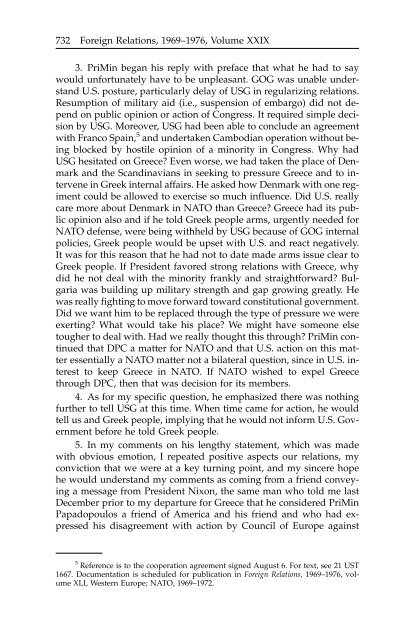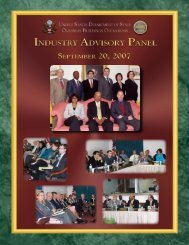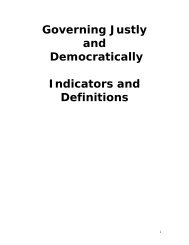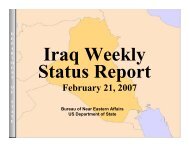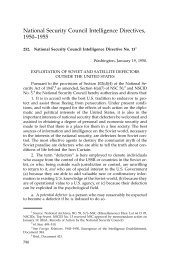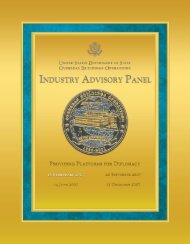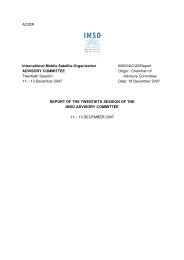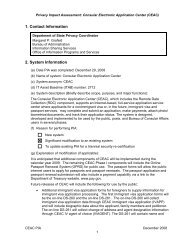Greece - US Department of State
Greece - US Department of State
Greece - US Department of State
Create successful ePaper yourself
Turn your PDF publications into a flip-book with our unique Google optimized e-Paper software.
732 Foreign Relations, 1969–1976, Volume XXIX<br />
3. PriMin began his reply with preface that what he had to say<br />
would unfortunately have to be unpleasant. GOG was unable understand<br />
U.S. posture, particularly delay <strong>of</strong> <strong>US</strong>G in regularizing relations.<br />
Resumption <strong>of</strong> military aid (i.e., suspension <strong>of</strong> embargo) did not depend<br />
on public opinion or action <strong>of</strong> Congress. It required simple decision<br />
by <strong>US</strong>G. Moreover, <strong>US</strong>G had been able to conclude an agreement<br />
with Franco Spain, 5 and undertaken Cambodian operation without being<br />
blocked by hostile opinion <strong>of</strong> a minority in Congress. Why had<br />
<strong>US</strong>G hesitated on <strong>Greece</strong>? Even worse, we had taken the place <strong>of</strong> Denmark<br />
and the Scandinavians in seeking to pressure <strong>Greece</strong> and to intervene<br />
in Greek internal affairs. He asked how Denmark with one regiment<br />
could be allowed to exercise so much influence. Did U.S. really<br />
care more about Denmark in NATO than <strong>Greece</strong>? <strong>Greece</strong> had its public<br />
opinion also and if he told Greek people arms, urgently needed for<br />
NATO defense, were being withheld by <strong>US</strong>G because <strong>of</strong> GOG internal<br />
policies, Greek people would be upset with U.S. and react negatively.<br />
It was for this reason that he had not to date made arms issue clear to<br />
Greek people. If President favored strong relations with <strong>Greece</strong>, why<br />
did he not deal with the minority frankly and straightforward? Bulgaria<br />
was building up military strength and gap growing greatly. He<br />
was really fighting to move forward toward constitutional government.<br />
Did we want him to be replaced through the type <strong>of</strong> pressure we were<br />
exerting? What would take his place? We might have someone else<br />
tougher to deal with. Had we really thought this through? PriMin continued<br />
that DPC a matter for NATO and that U.S. action on this matter<br />
essentially a NATO matter not a bilateral question, since in U.S. interest<br />
to keep <strong>Greece</strong> in NATO. If NATO wished to expel <strong>Greece</strong><br />
through DPC, then that was decision for its members.<br />
4. As for my specific question, he emphasized there was nothing<br />
further to tell <strong>US</strong>G at this time. When time came for action, he would<br />
tell us and Greek people, implying that he would not inform U.S. Government<br />
before he told Greek people.<br />
5. In my comments on his lengthy statement, which was made<br />
with obvious emotion, I repeated positive aspects our relations, my<br />
conviction that we were at a key turning point, and my sincere hope<br />
he would understand my comments as coming from a friend conveying<br />
a message from President Nixon, the same man who told me last<br />
December prior to my departure for <strong>Greece</strong> that he considered PriMin<br />
Papadopoulos a friend <strong>of</strong> America and his friend and who had expressed<br />
his disagreement with action by Council <strong>of</strong> Europe against<br />
5 Reference is to the cooperation agreement signed August 6. For text, see 21 <strong>US</strong>T<br />
1667. Documentation is scheduled for publication in Foreign Relations, 1969–1976, volume<br />
XLI, Western Europe; NATO, 1969–1972.


